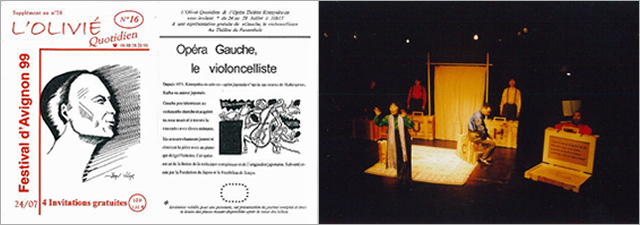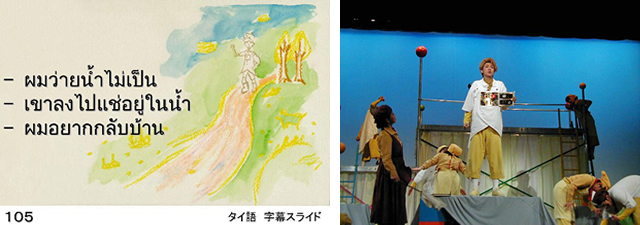MENU
Opera Theater Konnyakuza
English profile
English profile
History and aim
The Opera Theater Konnyakuza was founded in Tokyo in 1971, with an aim of creating and promoting new operas sung in Japanese by former members of student club called Konnyaku Exercise Club in Tokyo Arts University. Konnyaku Exercise Club was active from 1965 until 1977, led by the late Professor Mutsuko Miyagawa in physical education at the university, who later became an emeritus professor there. These members founded The Opera Theater Konnyakuza as a professional opera company with a repertoire of operas in Japanese language, constantly on tours.Since opera was first introduced to Japan,Japanese opera training has concentrated on bringing up opera singers on a par with professional singers in Europe in their skills testable on European stages. As a result, the skills needed to sing in Japanese have long been neglected and the Japanese audience has been forced to listen to performances in original languages. Even when a performance is in Japanese, the singers usually fail to deliver the songs clearly to them due to the lack of such training. Under such circumstances,Konnyakuza has been striving from its foundation to develop operas which are easy to listen to. In other words, we have been aiming at acquiring a method of singing which clearly tells the story to the audience. The success of such endeavor has been recognized in various fields.
Konnyakuza has been presenting innovative ideas in the direction with physical expression based on the training of "Konnyaku Exercise" in order to establish the honors of opera singers, who are generally known to be not so good actresses/actors in Japan. We have created and have done many performances of our productions not using a large-scale style of grand opera, but using only a piano or small-scale ensemble and a small number of singers. Currently, Konnyakuza carries on approximately 250 performances a year with Hikaru Hayashi as the artistic director, Kyoko Hagi as the music director and about 40 singers.
Main Repertoire
Composed by Hikaru Hayashi•Opera Gauche the Cellist (based on the novel by Kenji Miyazawa)
•Opera Dvenadtsat' mesyatsev (based on the novel by Samuil Marshak)
•Opera Metamorphosis (based on the novel by Franz Kafka)
•Opera I Am a Cat (based on the novel by Soseki Natsume)
•Opera Three Sisters (based on the novel by Anton P. Chekhov)
•Opera Inu no Adauchi (based on the novel by Hisashi Inoue)
•Opera Last Adventure of Don Quixote (based on the novel by Miguel de Cervantes Saavedra)
•Opera Romeo and Juliet (based on the novel by William Shakespeare)
and many more operas
Composed by Kyoko Hagi
•Opera General Son-Ba-yu and the Three Physicians (based on the novel by Kenji Miyazawa)
•Opera Konjiki-yasha (based on the novel by Koyo Ozaki)
•Opera Gulliver (based on the novel by Jonathan Swift)
•Opera Tsuki no Tami (based on the text by Tadashi Kato)
•Opera Nigorie (based on the novel by Ichiyo Higuchi)
•Opera Magaimon (based on the text by Wi Shing Chong)
•Opera Kosyoku Ichidai-otoko (based on the novel by Saikaku Ihara)
and many more operas
Composed by Hikaru Hayashi and Kyoko Hagi
•Opera Twelfth Night (William Shakespeare)
•Opera Time for Hamlet (adapted from the original by William Shakespeare)
•Opera A Midsummer Night's Dream (based on the text by William Shakespeare)
W. A. Mozart
Opera The Marriage of Figaro
Opera The Magic Flute
* Lots of these in our repertoire are directed by Tadashi Kato, Kiyokazu Yamamoto,
Akiko Ito, Wi Shing Chong and Hisao Takase.
Organization
Artistic DirectorHikaru Hayashi (Composer)
Music Director
Kyoko Hagi (Composer)
Performers (Singers)
OISHI Satoshi, UMEMURA Hiromi, AIHARA Tomoe, OKAHARA Mayumi, AOKI Misako, SATO Toshiyuki, TOMIYAMA Naoto, HANASHIMA Harue, TAKANO Uruo, ISHIKUBO Tomo, SUZUKI Hiroka, TOYOSHIMA Rie, HIKOSAKA Hitomi, YAMAMOTO Nobuko, OTA Mari, SHIMADA Daisuke, NISHIDA Reiko, KITANO Yuichiro, SAWAI Eiji, OKI Madoka, KUMAGAI Misato, SAITO Rutsu, IKI Takakuni, KANEMURA Shintaro, KAWANAKA Yuko, TAKEDA Shigeru, IINO Kaoru, ODA Aino, KOBAYASHI Yuzuko, SUZUKI Akane, TAKAOKA Yuki, FUYUKI Yoshimori, IZUMI Atsushi, OKUBO Satoru, ARAI Miki, YOSHIDA Shinya, IRIE Mana, NAKAMURA Hibiki, MATSUDA Yujiro.
Administrators
Azumi Tadachi, Maki Yumoto, Sayoko Ohara, Nanako Tanoue, Mugi Doi, Shino Takahashi.
friend of company
Sachio Kaneko, Kimiko Ishikawa, Takao Imura.
Awards
1976Vienna World Opera Award (the present Giraud Opera Prize),
the special prize awarded for the creativity in the general activities
1989
Giraud Opera Prize, the special prize awarded for Twelfth Night
The Arts Festival Prize for Music, awarded for Gauche the Cellist by the Agency for Cultural Affairs
Ongaku-no-tomo-sha Award for the creativity in the general activities
1992
Kids & Arts In Kobe Ensemble Award, for Gauche the Cellist
1997
Yasue Yamamoto Memorial Foundation Prize,
awarded for the work of Music Theatre in Japanese
The Mitsubishi Trust Music Award, for The Metamorphosis
2000
Tokyo Selection of Excellent Arts for Young People,
Tokyo Board of Education Award
Japan Arts Association Award
Arts for Citizen of Tokyo Award awarded for Teto the Robot
2002
Iihatobu Award, for all operas based on the novel by Kenji Miyazawa
by the Kenji Miyazawa Learned Society
2008
Child Welfare Cultural Award 2008, for Gauche the Cellist
Overseas Performances
1999 FranceProject: Festival d’Avignon
Performance: Opera Gauche the Cellist
Venue: Théâtre le funambule
Reviews:
… Six players are complete actors: they sing this "Chamber Opera" which mingle Western works, but also, they are masters of space, light, both mimes and ballet dancers… The music is beautiful, remarkable pianist, clever staging and focus on movement, the almost flying: see the Cuckoo…
La Gazette Provencale

2001 Indonesia / Thailand / India
Project: Asian Tour sponsored by The Japan Foundation
Performance: Opera Teto the Robot
Venue: Taman Ismail Marzuki (TIM) (Jakarta)
Thailand Cultural Centre Small Hall (Bangkok)
Shri Ram Centre (New Delhi)
Reviews:
… The songs composed in Japanese were melodious with universal appeal. They were the medium of communicating the depths of human emotions to the audience…
The Asian Age
… The program was a seamless knit of the traditional and the new, the Oriental and the Western…
The HINDU

2003 Malaysia / Thailand / Indonesia / Philippines
Project: Japan-ASEAN Exchange Year 2003
Performance: Opera Gauche the Cellist
Venue: The Actors Studio Bangsar (Kuala Lumpur)
The Small Hall, Cultural Center (Bangkok)
Gedung Kasenian Jakarta (Jakarta)
Carlos P. Romulo Theater (Manila)
Sinag Arts Studio (Manila)
Reviews:
…Thais in the audience found themselves enthralled and enraptured by the touching and thought-provoking story. At times, they seemed to understand the messages even without reading the subtitles…
The Nation

2005 South Korea
Project: Japan-Korea Friendship Year 2005
Performance: Opera Teto the Robot
Venue: Kookmin University Art Center (Seoul)
Goyang Oulim Nuri Arts Center Stars 'n Sand Theater (Goyang)

2007 Malaysia / Indonesia / Vietnam / Thailand / Laos
Project: 120 Anniversary of Japan-Thailand Diplomatic Relations, 2007
Performance: Opera Pinocchio
Venue: The Actors Studio@BSC (Kuala Lumpur)
Teater Kecil TIM (Jakarta)
Hanoi Opera House (Hanoi)
The Japan Foundation Bangkok Japanese Culture Center Main Hall (Bangkok)
Nakhon Ratchasima Rajabhat University (Nakhon Ratchasima)
Community Center (Khonkaen)
Udon Thani Rajabhat University (Udon Thani)
National Culture Hall (Vientiane)
Reviews:
… The performance provided good exposure to new Japanese opera and proved to be a great outing for the kids. It was, after all, a show for them, so the clearest evidence of success would have been their laugter, of which there was plenty.
The STARMAG

2009 Romania / Hungary / Austria / Czech Republic
Project: Japan-Danube Friendship Year 2009
Performance: Opera Metamorphosis
Venue: Teatrul National de Opereta “Ion Dacian” (Bucharest)
Merlin International Theatre (Budapest)
Jugendstiltheater (Vienna)
Alfred ve dvoře (Prague)
Reviews:
… Paradoxically, then, Yamamoto’s attempt to transplant Kafka’s irrational reality into a ‘normal family situation’ for the benefit of Japanese audiences, transplanted back to its place of origin, ends up acquiring another, different kind of ‘strangeness’ for European ones. Would Franz K. have relished this irony? My own hunch is that – after he’d recovered from the shock of his latest ‘metamorphosis’, of course – he probably would.
by Peter Burt (music critic)
… Opera performs by eleven singers, piano, violin, clarinet and bassoon. Their musical language is very colorful and appealing to listeners.Operatic arias which turns chanson, purely intoned unaccompanied polyphony, the dance rhythms of the café, quack cabaret hit, lyrical song and drama spoken text. All this sounds very European and Prague, with a remarkable degree of evocation of Kafka in Prague. Minimal instrumentation is used in color and funny…
The PRAVO

